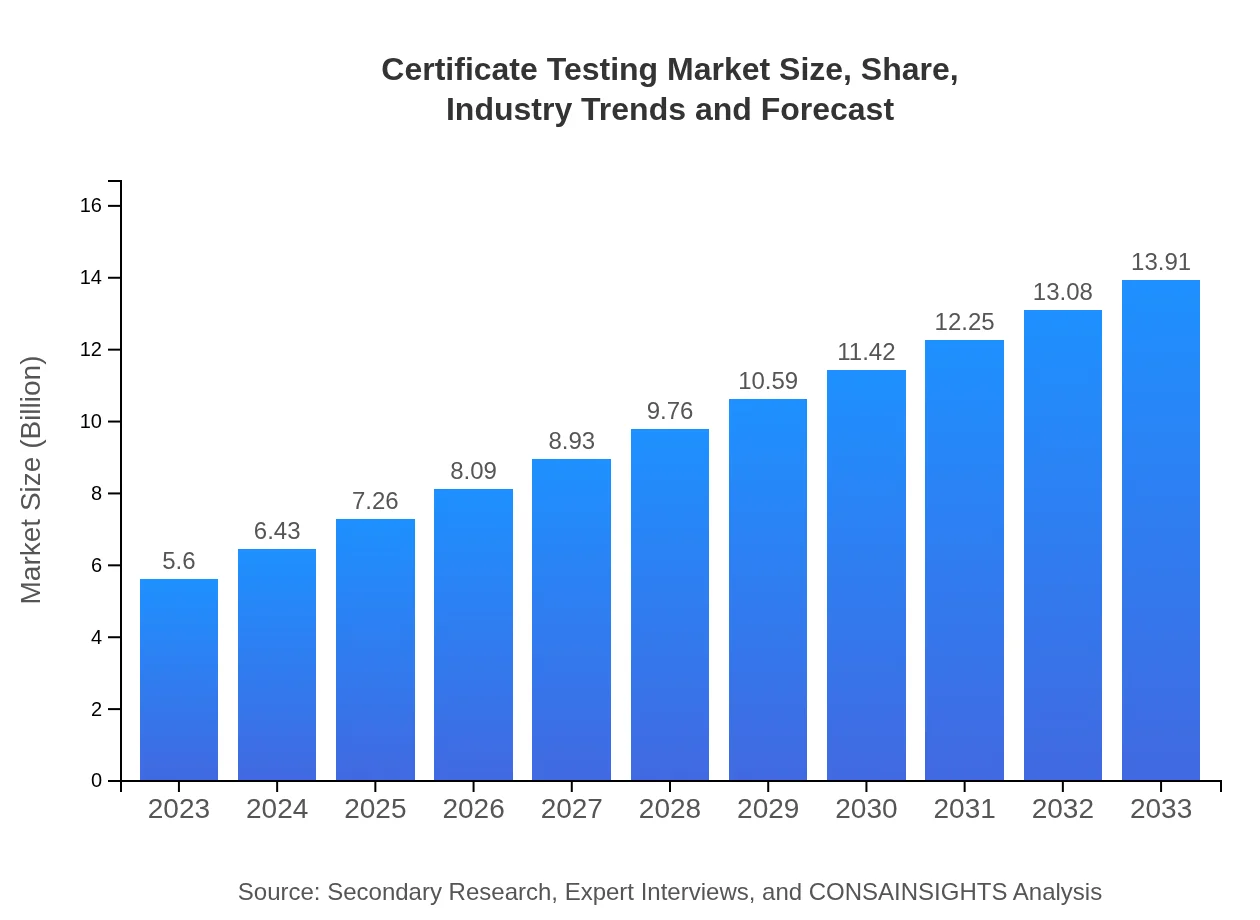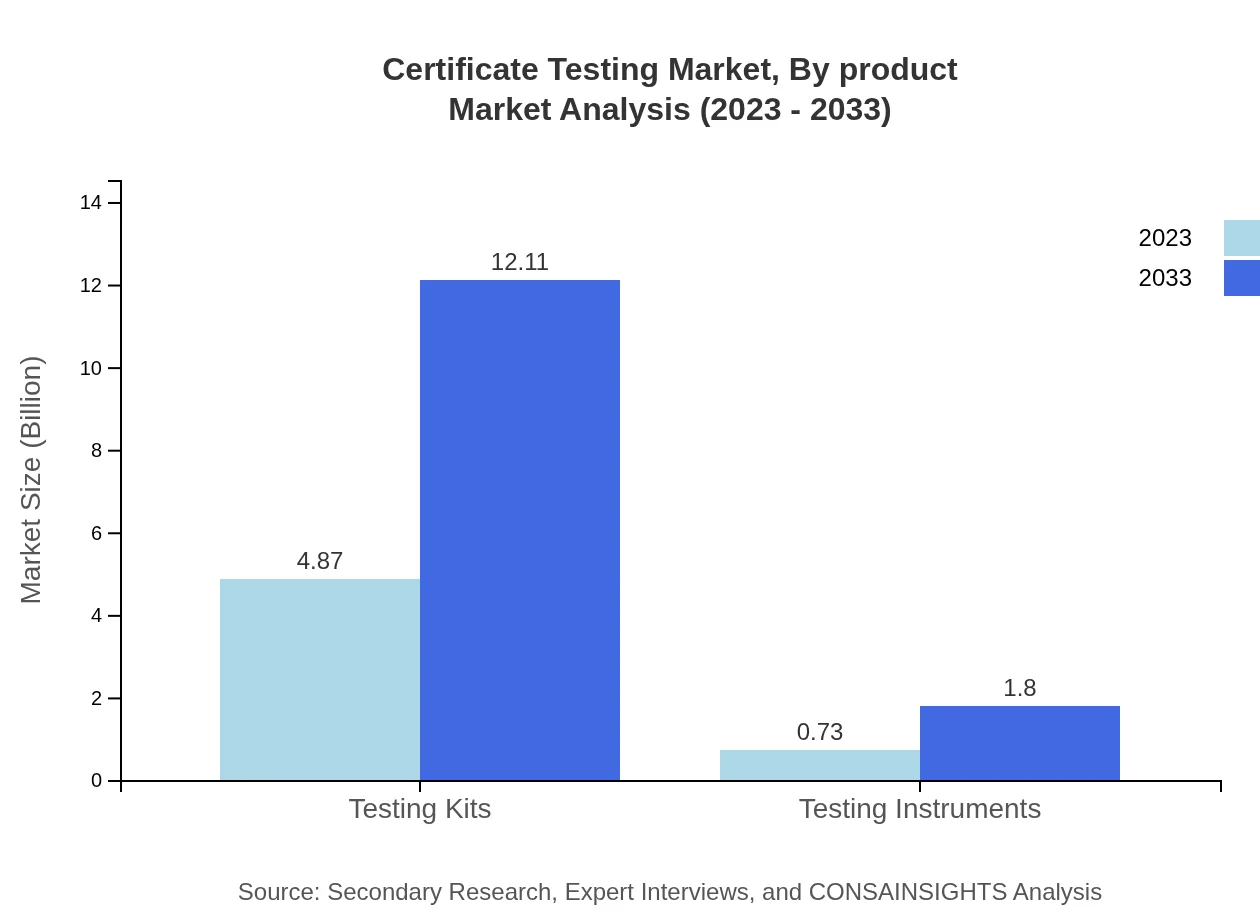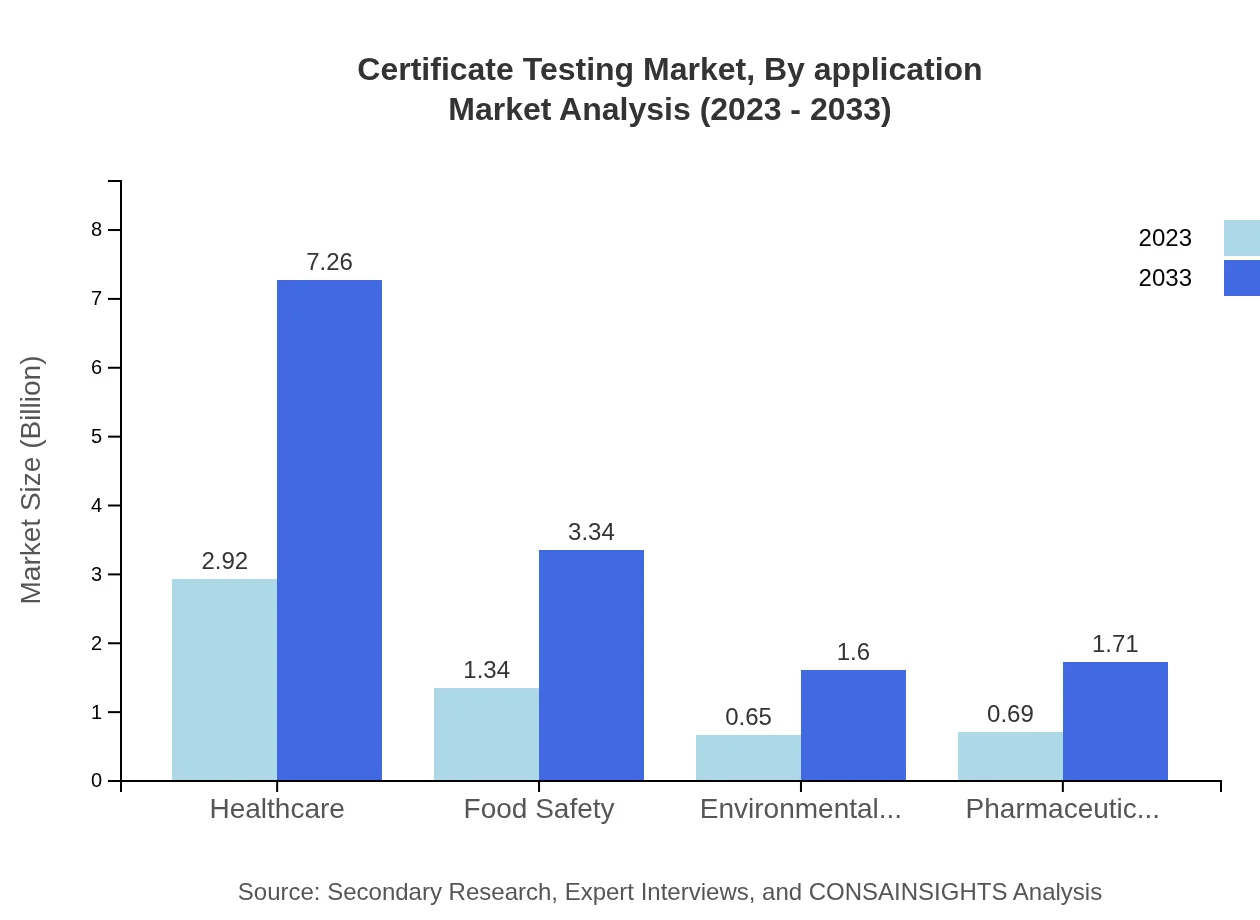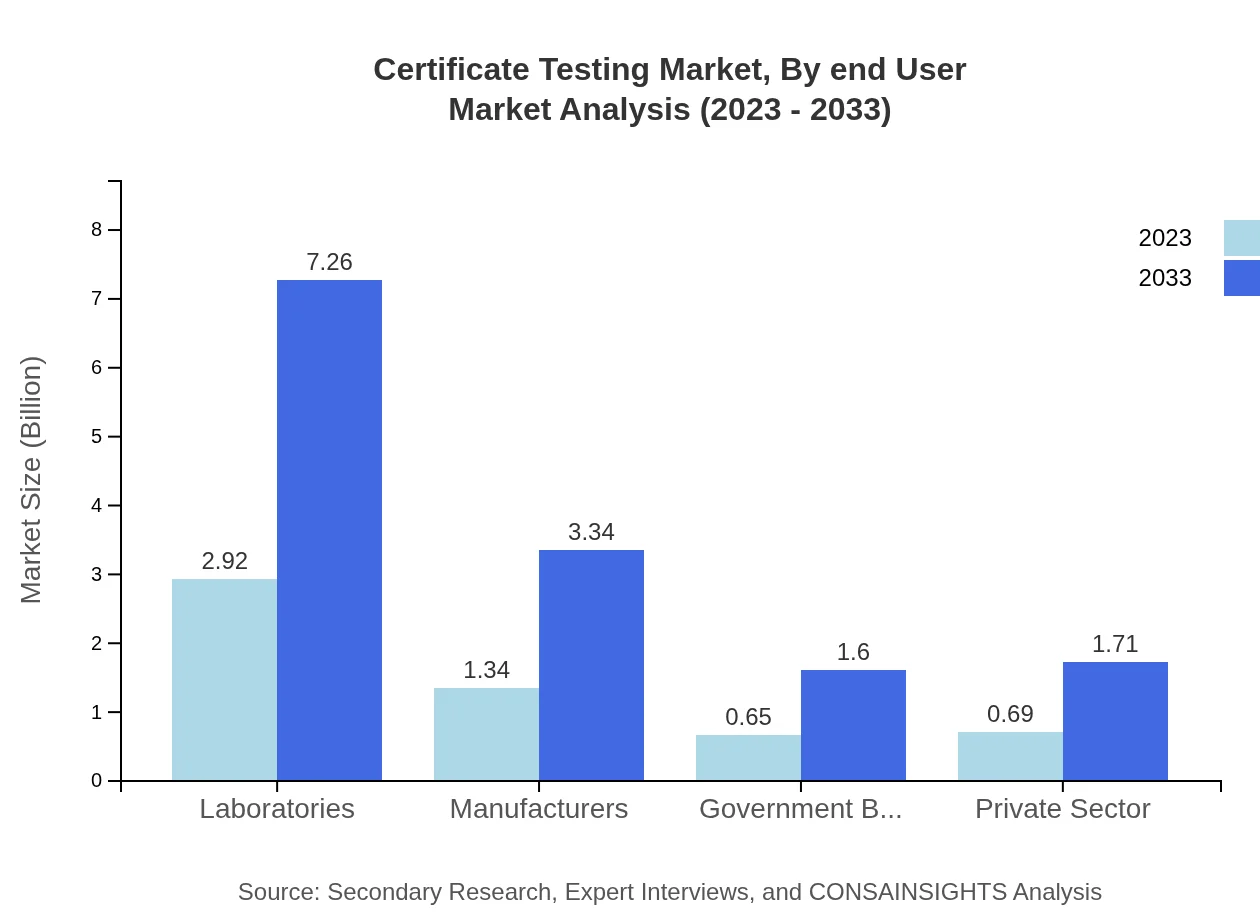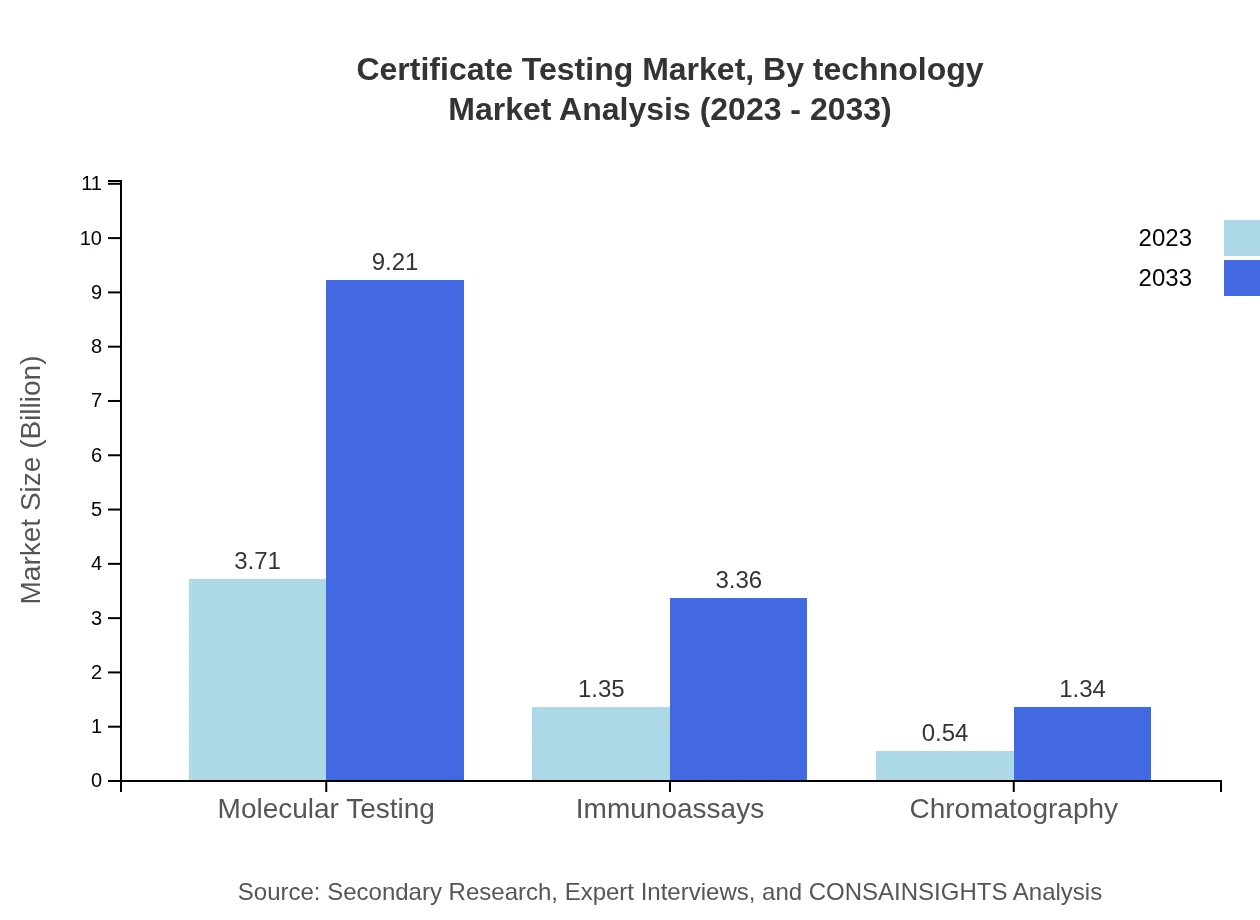Certificate Testing Market Report
Published Date: 31 January 2026 | Report Code: certificate-testing
Certificate Testing Market Size, Share, Industry Trends and Forecast to 2033
This report delivers a comprehensive analysis of the Certificate Testing market, providing insights into market size, growth forecast, industry trends, and regional assessments from 2023 to 2033.
| Metric | Value |
|---|---|
| Study Period | 2023 - 2033 |
| 2023 Market Size | $5.60 Billion |
| CAGR (2023-2033) | 9.2% |
| 2033 Market Size | $13.91 Billion |
| Top Companies | SGS SA, Intertek Group, Bureau Veritas |
| Last Modified Date | 31 January 2026 |
Certificate Testing Market Overview
Customize Certificate Testing Market Report market research report
- ✔ Get in-depth analysis of Certificate Testing market size, growth, and forecasts.
- ✔ Understand Certificate Testing's regional dynamics and industry-specific trends.
- ✔ Identify potential applications, end-user demand, and growth segments in Certificate Testing
What is the Market Size & CAGR of Certificate Testing market in 2023?
Certificate Testing Industry Analysis
Certificate Testing Market Segmentation and Scope
Tell us your focus area and get a customized research report.
Certificate Testing Market Analysis Report by Region
Europe Certificate Testing Market Report:
In Europe, the market is expected to grow from $1.77 billion in 2023 to $4.39 billion by 2033. Increasing compliance with stringent regulatory standards and the presence of a well-established laboratory network reaffirms Europe's position as a leader in the Certificate Testing market.Asia Pacific Certificate Testing Market Report:
In 2023, the Certificate Testing market in the Asia-Pacific region is valued at approximately $1.07 billion, projected to grow to $2.65 billion by 2033. This growth is driven by the burgeoning healthcare industry, rising food safety concerns, and increasing awareness of environmental regulations. The region's rapid urbanization and industrial growth further accentuate the need for robust testing services.North America Certificate Testing Market Report:
The North American Certificate Testing market is currently valued at $1.92 billion, with forecasts suggesting growth to $4.78 billion by 2033. Regulatory changes and a robust healthcare system contribute significantly to demand for testing services. Major players in this market are focusing on technological advancements and expanding their portfolios to include comprehensive testing solutions.South America Certificate Testing Market Report:
The South American market was valued at $0.28 billion in 2023, with expectations to grow to $0.69 billion by 2033. The region faces increasing scrutiny on health and food safety standards, leading to a rise in demand for certification testing. Investment in infrastructure and regulatory frameworks is expected to bolster market growth.Middle East & Africa Certificate Testing Market Report:
The Middle East and Africa market for Certificate Testing is valued at $0.57 billion in 2023, with a projected growth to $1.41 billion by 2033. The region is experiencing growing healthcare investments and a heightened focus on environmental safety, necessitating the expansion of testing services.Tell us your focus area and get a customized research report.
Certificate Testing Market Analysis By Product
The product segments for the Certificate Testing market are detailed as follows: Testing Kits dominate the market, valued at $4.87 billion in 2023, growing to an estimated $12.11 billion by 2033, holding an 87.05% market share. Testing Instruments follow with $0.73 billion currently expected to reach $1.80 billion, commanding a 12.95% share. Laboratories account for $2.92 billion, with forecast growth to $7.26 billion, maintaining a share of 52.19%, while Manufacturers show a strong presence with $1.34 billion, expected to grow to $3.34 billion. Government Bodies, Private Sector, and other segments showcase significant market contributions as they cater to diverse testing needs across industries.
Certificate Testing Market Analysis By Application
Applications in the Certificate Testing market include healthcare, food safety, environmental testing, pharmaceutical testing, and more. Healthcare takes a significant share with a market size of $2.92 billion in 2023, projected to expand to $7.26 billion. Food Safety also plays a vital role, valued at $1.34 billion and expected to grow similarly. Environmental testing, valued at $0.65 billion, is integral to policy compliance as increasing regulations drive market demand. Pharmaceutical Testing, while smaller at $0.69 billion, is growing consistently, reflecting heightened R&D activities.
Certificate Testing Market Analysis By End User
End-users in the Certificate Testing market encompass government bodies, private sectors, laboratories, and manufacturers. Laboratories represent a robust segment, valued at $2.92 billion and expected to grow significantly. Healthcare institutions, which frequently utilize testing services, continue to push for innovations in testing methodologies and practices. Private and government sectors also play a crucial role in shaping standards and compliance, thus contributing significantly to overall market dynamics.
Certificate Testing Market Analysis By Technology
Technological advancements are revamping the Certificate Testing landscape. Technologies such as molecular testing, immunoassays, and chromatography command substantial market shares, with molecular testing dominating the scene with $3.71 billion in size for 2023 and projected growth to $9.21 billion by 2033. Immunoassays also showcase relevance with steady growth from $1.35 billion to $3.36 billion. Emerging technologies are expected to enhance accuracy and efficiency in the testing market, allowing industries to maintain compliance and safety standards.
Certificate Testing Market Trends and Future Forecast
Tell us your focus area and get a customized research report.
Global Market Leaders and Top Companies in Certificate Testing Industry
SGS SA:
SGS is a global leader in inspection, verification, testing and certification services, providing a wide range of Certificate Testing services across multiple sectors and geographical locations.Intertek Group:
Intertek delivers quality and safety solutions to industries, helping companies to tackle risks linked to product safety, quality assurance, and regulatory compliance through robust testing methodologies.Bureau Veritas:
Bureau Veritas is a recognized front-runner in the field of testing, inspection, and certification; its strong focus on delivering tailored services to clients has established a robust presence in the Certificate Testing market.We're grateful to work with incredible clients.









FAQs
What is the market size of certificate Testing?
The certificate-testing market is currently valued at approximately $5.6 billion, with a projected CAGR of 9.2% from 2023 to 2033. This growth reflects increasing demand for regulatory compliance and quality assurance across various industries.
What are the key market players or companies in this certificate Testing industry?
Key players in the certificate-testing industry include major laboratories and manufacturers specializing in testing kits, instruments, and services tailored to regulatory compliance. These companies drive innovation and standards in the sector, maintaining competitiveness and market leadership.
What are the primary factors driving the growth in the certificate Testing industry?
Key drivers include stringent regulations, rising global health concerns, advancements in testing technologies, and the increasing need for quality assurance in sectors like healthcare and food safety. These factors collectively contribute to the expanding market.
Which region is the fastest Growing in the certificate Testing?
The fastest-growing region in the certificate-testing market is Europe, projected to grow from $1.77 billion in 2023 to $4.39 billion by 2033. Other regions like North America and Asia-Pacific are also experiencing substantial growth.
Does ConsaInsights provide customized market report data for the certificate Testing industry?
Yes, ConsaInsights offers customized market report data for the certificate-testing industry, tailored to specific client needs and preferences. This service ensures that clients receive relevant insights aligned with their business objectives.
What deliverables can I expect from this certificate Testing market research project?
Expect comprehensive deliverables, including detailed market analysis, segment data, regional forecasts, competitive landscape insights, and tailored recommendations that facilitate informed business decisions in the certificate-testing sector.
What are the market trends of certificate Testing?
Current trends in the certificate-testing market include increasing automation in testing processes, a rise in molecular testing methods, a focus on sustainability, and growing emphasis on compliance for consumer safety and environmental standards.

